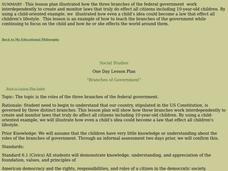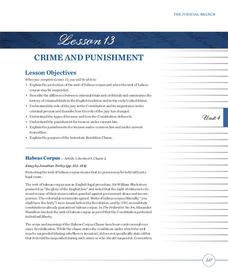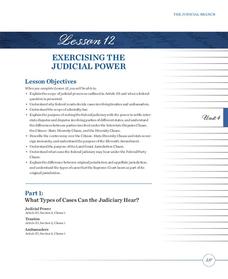Center for Civic Education
What Basic Ideas About Government Are Included in the Preamble to the Constitution?
Young historians explore the meaning of the Preamble to the US Constitution in this upper-elementary social studies lesson. Working with partners or in small groups, children discuss the purpose of government before reading and analyzing...
Council for Economic Education
The Role of Government: The Federal Government and Fiscal Policy
Give learners a crash course in balancing the books on the United States federal government level with an economics and government resource. Class members engage in a warm-up discussion and brainstorming session before answering...
Curated OER
Case Study: Constitutional Law
Posed here is an issue of land ownership and law from the year 1773. Learners can use what they know about the US Constitution, statehood, and Articles I, III, and IV to answer five questions regarding the scenario.
Friends of Fort McHenry
Privateers in the War of 1812: Soldiers or Thieves?
Do governments have the right to authorize individuals to perform illegal acts during times of war? Did the US government really employ pirates? Use the War of 1812 as your vessel to answering these questions through class discussion and...
Curated OER
Citizens of the Future
Young sociologists explore how local, state, and federal governments work. This very impressive and ambitious lesson requires pupils to contact government officials who represent them and their families. They research elections, and hold...
Curated OER
The Three Branches of Government
In this US government worksheet, students fill in a graphic organizer that has the three branches of government and who heads up each branch. Students then answer 7 short answer questions about the chart. Prior knowledge or research...
College Board
Civic Knowledge and Action in AP U.S. Government and Politics
Vote, it's your civic duty! The high school lesson focuses on voter turnout and civic participation with a series of activities. Young scholars analyze data to discover voter turnout trends, complete worksheets, and participate in group...
Heritage Foundation
Lawmaking and the Rule of the Law
How many constitutional clauses does it take to create a bill? High schoolers find out with several activities and selected clauses about the rule of law and the US Constitution. Various coinciding activities help to strengthen learning.
Curated OER
US Government: Foreign Policy
Learners explore the basic precepts of American foreign policy. In this diplomacy lesson, students read textbook chapters regarding American foreign policy practices before and after World War II. Learners also watch a filmstrip...
Center for Civic Education
What Basic Ideas Are in the Preamble to the Constitution?
Introduce young historians to the US Constitution with this upper-elementary social studies lesson plan. Beginning with a general discussion about the role of government in society, students go on to work in small groups identifying and...
Curated OER
Branches of Government
Students explore the three branches of government. In this government and U.S. history activity, students listen to a story about a boy who attempts to sponsor a bill to ban cartoons. Students interview three teachers who each represent...
Curated OER
Regents High School Examination: United States History and Government, 2006, #2
In this United States history and government standardized test practice worksheet, learners respond to 50 multiple choice questions, 2 essay prompts, and 14 short answer questions that require them to review their knowledge of history...
Curated OER
ONE VOTE
In order to understand the political process and the importance of voting, pupils will construct a class time line. They will group up and research a specific era, creating a time line of political events where one vote made a...
Heritage Foundation
The House of Representatives
The House of Representatives has a lot of responsibility in the United States government. But how did it all begin, and why is it the way it is now? A comprehensive lesson answers all of these questions about the US Constitution and...
Heritage Foundation
Courts and Judges
If the Supreme Court is so supreme, why do all cases not just start there? High schoolers learn why every case does not start at the Supreme Court as well as the importance of hierarchy in the US judicial system in the 11th installment...
Heritage Foundation
Crime and Punishment
You wouldn't give someone a 10-day timeout for eating a piece of candy. The US government, too, does not believe in unreasonable punishment. A variety of exercises exploring the clauses of the US Constitution prompts class members to...
PBS
Analyzing McCulloch v. Maryland
What happened in the Supreme Court case of McCulloch v. Maryland? The resource teaches the specifics of the case with a video and provided discussion questions covering issues such as precedent and the Supreme Court as an equal branch of...
NPR
Civil Rights of Japanese-American Internees
Prompted by a viewing of Emiko and Chizu Omori’s Rabbit in the Moon, a documentary about the internment of Japanese-Americans during World War II, high schoolers examine a series of documents, including the Bill of Rights and the UN’s...
Curated OER
It's About Us
Students understand ideas about civic life and government. In this census lesson, students participate in a First We Count Reader's Theater and answer reading questions about the script in order to gain a better understanding of the...
Curated OER
Why Do We Need Limited Government?
Students study how limited government protects individual rights and identify the limits that are placed on US authorities. They investigate the meaning of discrimination and individual rights as they complete the attached worksheet.
Street Law
The Challenge of Selecting an Ideal Supreme Court Nominee
Nearly every president has had the opportunity to name a nominee to the United States Supreme Court. But what makes someone an ideal candidate to become a Supreme Court justice? High schoolers test their prior knowledge about the Supreme...
Heritage Foundation
Exercising Judicial Power
We should all do more exercising, but should the judicial branch as well? High schoolers develop their understanding of what powers the judicial branch carries because of the US Constitution, as well as where their limits lie in the...
National Endowment for the Humanities
Victory and the New Order in Europe
A New Order in Europe calls for a new lesson plan! This third plan in a series of four sequential lessons encourages high schoolers to read primary sources about the development of the New Order and follow up their knowledge with a...
Curated OER
The Beginnings of Constitutional Government
Students examine excerpts of Thomas Paine's Common Sense. In this early American history lesson, students read Paine's pamphlet and analyze the information according the rubric provided.

























